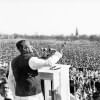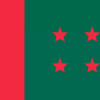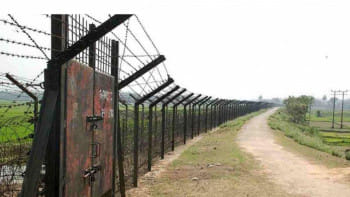Remembering the Patriarch

In the annals of the political struggles of Bangalees, March 17 shall forever occupy a special place as, on this day in 1920, Bangabandhu Sheikh Mujibur Rahman was born. Bangabandhu, which means "friend of Bengal," as he was fondly addressed, was indeed special because without him, it is rightly doubted if the advent of a sovereign Bangladesh could have been a reality. To understand the import of such a belief, one has to trace the history of our pre-1971 political struggle.
Even a dispassionate study of our political emancipation would clearly show that years of political mobilisation by Bangabandhu – particularly after February 1966 when the historic Six-Point Programme was presented – had made Bangalees conscious of their identity. In Bangladesh's case, national sovereignty was inculcated into the consciousness of the masses through a deliberate political process. This mass character of consciousness-building provided the underlying strength to the nationalist movement. It also gave substance to the assertion of national sovereignty in March 1971 by Bangabandhu and the people of Bangladesh.
Bangabandhu, through an intense process of national consciousness-building, equipped a people politically to take up arms and be prepared to shed their blood to defend their newly acquired sovereignty. Herein lies his greatness, because in March 1971 "a sense of Bangladesh's sovereign status took root and people became psychologically prepared to defend their sovereignty" (Rehman Sobhan, From Two Economies to Two Nations: My Journey to Bangladesh). When the Pakistan Army launched its attack on the people of Bangladesh on the night of March 25, 1971, the entire population rose up to resist it in the absence of any coordinated military direction.
In 1971, Bangabandhu transcended conventional political reckoning, and his charisma dominated the political campaign. He became a symbol in his own lifetime and personified Bangalee nationalism, "just as Nasser personified Arab nationalism or the Quaid Muslim nationalism." He became the unchallenged spokesman of Bengal, and his voice was heard beyond Pakistan and within the international community. History chose him to lead Bengal's struggle for emancipation. "For the first time, since the Battle of Plassey, Bangalees awoke to the fact that they were ruling themselves through their freely elected representatives."
Even a dispassionate study of our political emancipation would clearly show that years of political mobilisation by Bangabandhu – particularly after February 1966 when the historic Six-Point Programme was presented – had made Bangalees conscious of their identity. In Bangladesh's case, national sovereignty was inculcated into the consciousness of the masses through a deliberate political process. This mass character of consciousness-building provided the underlying strength to the nationalist movement. It also gave substance to the assertion of national sovereignty in March 1971 by Bangabandhu and the people of Bangladesh.
Bangladesh "owes a blood debt to the people who shed their blood for the liberation of (the country) and to the leader who played such a critical role in inculcating this sense of nationhood within the people." It is a tragedy that Bangabandhu, the symbol of our nationhood, was not only assassinated but also shamefully marginalised from our historical consciousness for 21 long years.
Bangabandhu's lifelong struggle was centred on establishing real democracy, as he believed that democracy expresses the long-suppressed desire of the people to govern themselves and to guide their own destiny. People looked ahead to a new dawn, after a long spell of terror and oppression suffered under colonial rule and military dictatorships.
Unfortunately, there were in Bangladesh events to undermine democracy and subject the people, once again, to the oppression of a military dictatorship.
Bangabandhu was strongly against the cynical exploitation of religion for bolstering the interest of the ruling elite. He believed in creating an environment in which all religious communities could coexist in harmony, free from discrimination and intolerance. In 1973, at the Non-Aligned Summit in Algiers, in response to a query from Libya's President Muammar Gaddafi as to why Bangladesh embodied secularism in its constitution, Bangabandhu replied, "Our secularism is not against religion. Our secularism stands for harmony among members of all religions. Indeed, in the opening of the Koran, Allah is described as Rabbul Alameen, the Lord of all creation, and not Rabbul-Muslimin, the Lord only of Muslims. This is the spirit which underlines our secularism" (Kamal Hossain, Bangladesh: Quest for freedom and justice).
Discerning observers would like to know if, in our political discourses, we are witnessing a temper that presses a partisan advantage to a bitter end, and that there is no serious effort to understand and respect the other side and also to create a feeling of unity among all citizens. Surely we cannot deny that democracy depends on habits of consent and compromise, which are attributes of mature societies. The objective of such a society is to establish a lawful government by the majority, under the rule of abiding law, and with freedom of opposition and dissent. By upholding the spirit of moderation, we will surely be paying a fitting tribute to Bangabandhu's contribution to our democracy.
It is also time, in line with Bangabandhu's cherished goal, to create and strengthen an environment in which all religious communities would adequately live in harmony by rejecting the bigotry and hypocrisy of pre-1971 times. The struggle against communalism has to be fought relentlessly.
The verve and vigour of Bangabandhu's personality was brilliantly illustrated by his continuous wandering beyond the safe provision of personal gratification. He was in our midst for cohesiveness and dignity, and not for power and acquisitiveness. Salute to the great patriarch.
Muhammad Nurul Huda is a former IGP of Bangladesh Police.

 For all latest news, follow The Daily Star's Google News channel.
For all latest news, follow The Daily Star's Google News channel. 










Comments